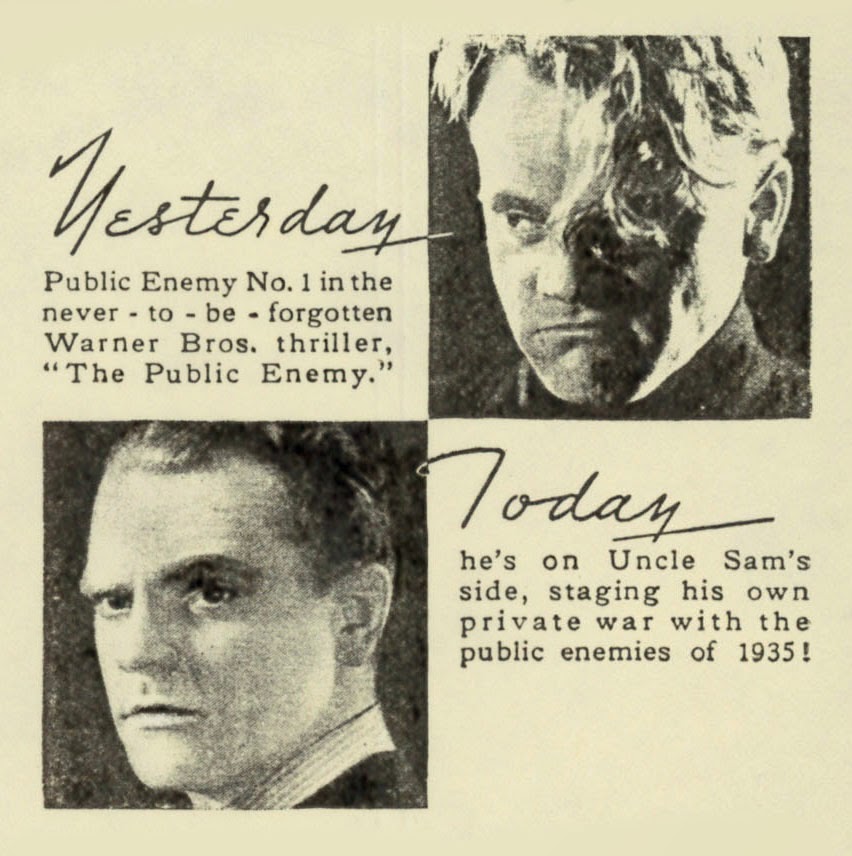Those Chicago Censors Never Learn ...
Now They Want To Ban "Too Exciting" G-Men (1935)
You'd have thought they were kidding ... were
 |
| Line Up, Folks. Jim's On Our Side Now |
Warners got possessive in a hurry, figured they owned the very concept of federal law dogging. To quell competitors, they'd seek protection of courts. Edward Small got out a smallish exploiter called Let 'Em Have It, in which FBI men Richard Arlen, Gordon Jones, and Harvey Stephens rack up bank-robbing Bruce Cabot and mob. What burned WB was Small referencing "Government Men" in ads, this an alleged infringement upon just-released G-Men. Also an irritant was Let 'Em Have It being shown in theatres owned by the Great States circuit. They'd done no business with Warners for whole of a current season, this much of reason for the latter's retaliatory move. Distribution and exhibition were two of a three-headed monster that was the majors-dominated movie industry, and so far as these Ghidrahs were concerned, little fish like Edward Small could go fry. This was mile-high, if not accustomed, arrogance on Warners' part, another instance of the big bully picking on a little bully (remember Casablanca vs. A Night In Casablanca?). But justice would for once prevail when the judge told plaintiffs to take a hike, and Let 'Em Have It went on to what reward it could scrounge.
The Bureau had decidedly mixed emotion re movie adapt of its operation.
Cagney had been stuck doing comic variation of his urban caveman since Public Enemy stirred storm of protest and ultimate clampdown by an empowered Production Code. No more gangster pics was censorship's fresh edict, and so personalities like Cagney, wired too tight to stay strictly within the law, had to play their hustle for laughs and leave firearms off the menu. Warners kept Cagney out of a rut's way by using him in a musical (Footlight Parade) and then service yarns (Here Comes The Navy, Devil Dogs Of The Air), uniforms a safest alternative to the gangster motif, as they rechanneled Jim's excess energy to military purpose. The same formula would be applied to G-Men, Cagney entering as raw recruit to the Bureau where he'll learn it's best to play by rules. Within this short period, then, JC would go from street menace to defender of same, casting a matter of which branch he'd serve or badge he'd wear. There wouldn't be another Cagney bad man until Angels With Dirty Faces in 1938.
 |
| Genius Showman Don Nichols of Charlotte's Broadway Theatre Draws a Curious Crowd To a Parked Car That Once Belonged to Al Capone, a Surefire Tie-In with G-Men |
And yet ... Warners knew it was memory of Public Enemy from which much of Cagney energy flowed, and they'd assure 1935 patronage that G-Men was a same flavor of raw meat, which indeed it was in terms of let-loose violence and firepower that hadn't been on screens since that first flush of gangstering now in concrete shoes fitted by the Code. Maybe Warners couldn't reissue Public Enemy and ones like it, but merchandising could still promise ticket-buyers "The Same James Cagney That Gave Them Public Enemy." Added to this was urgency of crime-on-upswing that was Depression era scourge, plus conviction that only a gloves-off FBI could stop it. G-Men was a hardest sell for arming Fed agents with same lethal weaponry as thugs they pursued, and letting chase extend past state lines that were previous barrier to law enforcement. Give criminals the same harsh medicine they dealt out, said G-Men's army, but not on vigilante terms. With Cagney and company on duty, there'd be no need for self-help in any case.
Showmen filled lobbies with display of police firearms and standee rundown of Most Wanted Public Enemies. Fingerprinting of patronage was offered as bally and civic service, this a lure to mothers who'd want offspring digits recorded in event of kidnap later on. That's how profound fear of babies being snatched had become since the Lindbergh horror. G-Men made hay on real-life anxiety stirred by everyday headlines that made crime seem altogether out of control. Ninety minutes of reassurance from Warner Bros. seemed fair exchange for anyone's admission, which in G-Men instance totaled a million in profit, the biggest gain yet for a Cagney show. G-Men would prove continuing worth by its inclusion with










1 Comments:
Interesting to note in G-Men v. Let 'Em Have It is the King Kong veteran confrontation of Robert Armstrong in the former and Bruce Cabot in the latter.
Post a Comment
<< Home